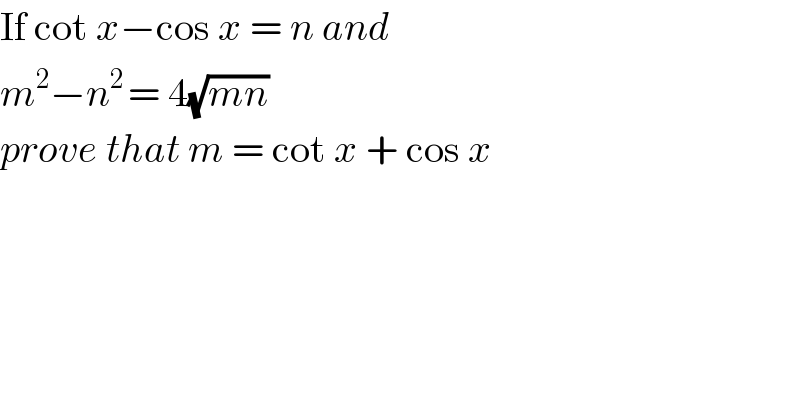Question Number 85386 by john santu last updated on 21/Mar/20

$$\mathrm{If}\:\mathrm{cot}\:{x}−\mathrm{cos}\:{x}\:=\:{n}\:{and}\: \\ $$$${m}^{\mathrm{2}} −{n}^{\mathrm{2}\:} =\:\mathrm{4}\sqrt{{mn}} \\ $$$${prove}\:{that}\:{m}\:=\:\mathrm{cot}\:{x}\:+\:\mathrm{cos}\:{x}\: \\ $$
Answered by mind is power last updated on 23/Mar/20
![n=a−b m=(a+b) ⇒m^2 −n^2 =4ab=4(√(a^2 −b^2 )) ⇒a^2 b^2 =a^2 −b^2 ⇒a^2 =(b^2 /(1−b^2 )) ⇒n=(b/( (√(1−b^2 ))))−b⇒=cot(x)−cos(x) f(b)=(b/( (√(1−b^2 ))))−b f′(b)=(((√(1−b^2 ))+(b^2 /( (√(1−b^2 )))))/((1−b^2 )))−1 =(1/((1−b^2 )(√(1−b^2 ))))−1>0 since b∈]−1,1[ f(b) is increase function f(cos(x))=cot(x)−cos(x)⇒b=cos(x)⇒ a=cot(x)⇒m=a+b=cot(x)+cos(x)](https://www.tinkutara.com/question/Q85578.png)
$${n}={a}−{b} \\ $$$${m}=\left({a}+{b}\right) \\ $$$$\Rightarrow{m}^{\mathrm{2}} −{n}^{\mathrm{2}} =\mathrm{4}{ab}=\mathrm{4}\sqrt{{a}^{\mathrm{2}} −{b}^{\mathrm{2}} } \\ $$$$\Rightarrow{a}^{\mathrm{2}} {b}^{\mathrm{2}} ={a}^{\mathrm{2}} −{b}^{\mathrm{2}} \\ $$$$\Rightarrow{a}^{\mathrm{2}} =\frac{{b}^{\mathrm{2}} }{\mathrm{1}−{b}^{\mathrm{2}} } \\ $$$$\Rightarrow{n}=\frac{{b}}{\:\sqrt{\mathrm{1}−{b}^{\mathrm{2}} }}−{b}\Rightarrow={cot}\left({x}\right)−{cos}\left({x}\right) \\ $$$${f}\left({b}\right)=\frac{{b}}{\:\sqrt{\mathrm{1}−{b}^{\mathrm{2}} }}−{b} \\ $$$${f}'\left({b}\right)=\frac{\sqrt{\mathrm{1}−{b}^{\mathrm{2}} }+\frac{{b}^{\mathrm{2}} }{\:\sqrt{\mathrm{1}−{b}^{\mathrm{2}} }}}{\left(\mathrm{1}−{b}^{\mathrm{2}} \right)}−\mathrm{1} \\ $$$$\left.=\frac{\mathrm{1}}{\left(\mathrm{1}−{b}^{\mathrm{2}} \right)\sqrt{\mathrm{1}−{b}^{\mathrm{2}} }}−\mathrm{1}>\mathrm{0}\:\:{since}\:{b}\in\right]−\mathrm{1},\mathrm{1}\left[\right. \\ $$$${f}\left({b}\right)\:{is}\:{increase}\:{function}\: \\ $$$${f}\left({cos}\left({x}\right)\right)={cot}\left({x}\right)−{cos}\left({x}\right)\Rightarrow{b}={cos}\left({x}\right)\Rightarrow \\ $$$${a}={cot}\left({x}\right)\Rightarrow{m}={a}+{b}={cot}\left({x}\right)+{cos}\left({x}\right) \\ $$
